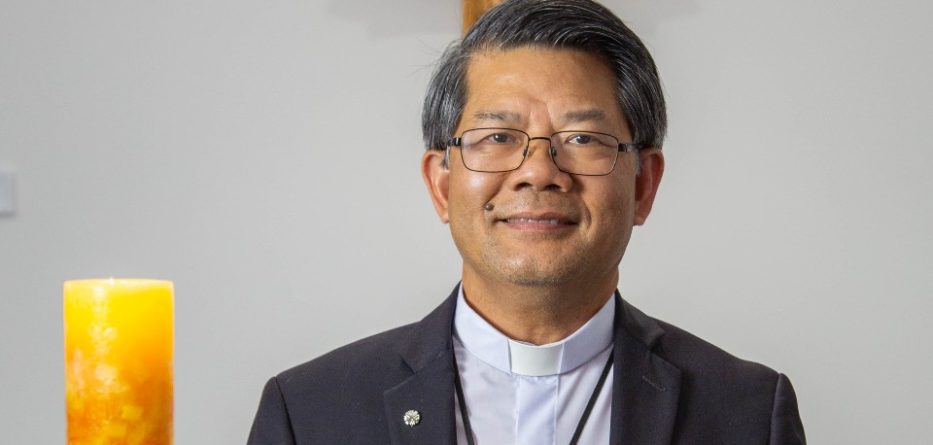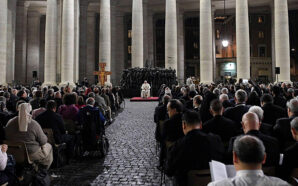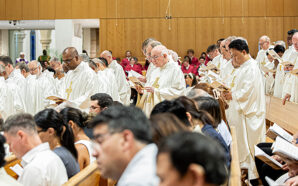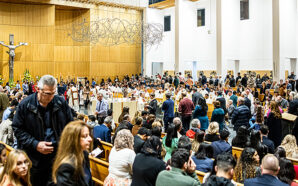Over the holiday break, Catholic Outlook is showcasing some of its most viewed, inspiring and thought-provoking articles from 2021. Below is Bishop Vincent’s full Dom Helder Camara Lecture from June 2021, entitled ‘My hope for the Plenary Council’.
This article was originally published on 30 June 2021.
Most Reverend Vincent Long Van Nguyen OFM Conv DD STL, Bishop of Parramatta
Dom Helder Camara Lecture
“My hope for the Plenary Council”
Parkville, Victoria, 30 June 2021
Plenary Council: Abundance of goodwill or the last throw of the dice?
With a few months to the first session of the long-awaited Plenary Council (PC2020), we are finally headed down the home stretch. The initial phase of listening drew nearly 220,000 people across Australia and 17,500 individual and group submissions. These submissions were distilled into the six national theme papers and then further distilled again into the working document and finally the agenda. Momentum for the Plenary Council ebbed and flowed during this process, which has been disrupted by the pandemic.
By and large, there has been considerable goodwill, enthusiasm and even a sense of hope for the future of the Church in Australia in the post-Royal Commission period. Robert Fitzgerald who – among other prominent roles – is the new Chair of Caritas Australia, once enthused that the Plenary Council is the only game in town. For a country of about five million nominal Catholics, the initial response was quite remarkable. Perhaps, for many of the disenfranchised, it is the last throw of the dice. I wouldn’t put all my eggs in one basket, though.
Some of you might have heard or even attended the first of the three convocation series organised by the Australasian Catholic Coalition for Church Reform (ACCCR). There were 3,000 participants, including myself. We heard a powerful and inspiring address by Sr Joan Chittister. Catholicism “must grow up”, she said, “beyond the parochial to the global, beyond one system and one tradition, to a broader way of looking at life and its moral, spiritual, ethical frameworks.”
That is the kind of stretching of the imagination and dreaming of the transformation of the Church that many Catholics are thirsting for. Few Catholics have any appetite left for cosmetic changes, mediocrity or worst, restorationism dressed up as renewal. We have struggled under the weight of the old ecclesial paradigm of clerical order, control and hegemony with a penchant for triumphalism, self-referential pomp and smugness. We yearn for a Church that commits to a God-oriented future of equal discipleship, relational harmony, wholeness and sustainability.
The revitalisation and convergence of many lay reform groups in response to the Plenary Council is no small development for the Church in contemporary Australia. It is a sign of the “growing up” that Joan spoke about. Australian Catholics are growing up beyond the passive, subservient to the co-responsible agents for the transformation of the Church. In Germany, there is a lay body called Central Committee, which plays a key role in their Synodal Assembly, including having one of its members as co-president of the said structure. Perhaps this unique feature is part of the legacy of the Reformation in the German Church.
Is the Church in Australia in pole position for deep reform?
The Church in Australia is uniquely positioned to move into a new fresh future. Yes, it is true that we have been humbled and reduced to near irrelevancy by the sexual abuse crisis. The Royal Commission, though being the lightning rod, has also served as a necessary wake-up call for Australian Catholics. Indeed, no other country in the world has conducted a similar national inquiry, which is as comprehensive in its scope as ours. This has brought about a heightened level of consciousness and an unprecedented momentum for deep reform.
In many areas, Australia punches above its weight. Could we be a leading light in the struggle for a more fit-for-purpose Church in this place and in this time? Could Australian Catholics rise to the challenge and co-create the synodal Church that Pope Francis has envisaged? While the Plenary Council may not address all of the issues of importance, it is certainly worth the effort in discerning the roadmap for the future.
Recently, Cardinal Marx of Germany tendered his resignation in a personal gesture to take responsibility for sexual abuses by priests over the past decades. In Chile, the bishops after a period of discernment offered to resign en masse for similar reasons. This collective act of contrition is totally unprecedented, and it shows the depth of the crisis in the Church. Whether or not we bishops of Australia should make the same radical gesture remains an open question. However, what is indisputable is the need for deep institutional change that will restore confidence and trust in the Church. Nothing less than a root-to-branch reform that will align our minds and hearts to the Gospel will do.
What the Church needs is not simply a renewal or an updating of methods of evangelising. Rather, what we desperately need is an inner conversion, a radical revolution in our mindsets and patterns of action. Gerald Arbuckle speaks of refounding as opposed to renewal. This refounding means going to the very cultural roots and a hope-filled journey into the paschal mystery for mission under the inspiration of the Holy Spirit. Unless we genuinely repent of institutional failures and unless we convert to the radical vision of Christ and let it imbue our attitudes, actions and pastoral practices, we will not be able to restore confidence and trust in the Church.
Conversion is one of the key areas on the agenda of the Plenary Council. It is framed in terms of our openness to learn and meet the needs of the world we live in. As a result, the questions revolve around our engagement with First Nations peoples, with the marginalised and the vulnerable. However, one wonders if conversion needs to be framed not just in terms of our openness to learn and meet the needs of others but also in terms of our examination of the Church’s attitude and treatment of racial minorities, women, LGBTQ+ individuals and others. Until we have the courage to admit the old ways of being Church, which is steeped in a culture of clerical power, dominance and privilege, we cannot rise to a Christ-like way of humility, inclusivity, compassion and powerlessness.
There is a sense in which the Church must change into a more Christ-like pattern of humility, simplicity and powerlessness as opposed to worldly triumphalism, splendour, dominance and power. Christians in the post-Royal Commission are like the Jews after the exile. The future of the Church, like the New Jerusalem that the exilic prophets often speak of, will not be revitalised by way of simply repeating what was done in the past. It will not be simply a restoration project or doing the old things better. Rather, we must have the courage to do new things; we must be open to the Spirit leading us to new horizons even as we tend to revert to the old ways.
Change of era and new way of being Church in the world
Many Catholics hope that the PC2020 will see a change in a number of priority issues such as greater inclusion of the laity, the role of women, clerical celibacy et cetera. While it is important that there is an openness and boldness to discuss these matters, what is more important is to envision a new way of being Church in the world.
The model of the Church based on clerical hegemony has run its course. Insofar as it is deeply embedded in patriarchal and monarchical structures, it is incapable of helping us to meet the needs of the world and culture in which we live. We have long moved out of the Ancien Régime and the age of absolute monarchs. We are on this side of the secular state and the rise of democracy. Yet it seems that the deeply entrenched patriarchal and monarchical structures of the Church have failed to correspond with our lived experience.
For the Church to flourish, it is crucial that we come to terms with the flaws of clericalism and move beyond its patriarchal and monarchical matrix. What is urgent is that we need to find fresh ways of being Church and fresh ways of ministry and service for both men and women disciples. New wine into new wineskins! The new wine of God’s unconditional love, radical inclusivity and equality needs to be poured into new wineskins of humility, mutuality, compassion and powerlessness. The old wineskins of triumphalism, authoritarianism and supremacy, abetted by clerical power, superiority, and rigidity are breaking.
It is worth noting that at the recent Synod on the Amazon, the synod bishops say they consider it “urgent” for the Church to “promote and confer ministries for men and women in an equitable manner.
“It is the Church of baptised men and women that we must strengthen by promoting ministeriality and, above all, the awareness of baptismal dignity,” they state. Beyond these generic statements, it remains to be seen how women can share in the decision-making power and institutionalised ministries in the Church.
The Church cannot have a better future if it persists in the old paradigm of triumphalism, self-reference and male dominance. So long as we continue to exclude women from the Church’s governance structures, decision-making processes and institutional functions, we deprive ourselves of the richness of our full humanity. So long as we continue to make women invisible and inferior in the Church’s language, liturgy, theology and law, we impoverish ourselves. Until we have truly incorporated the gift of women and the feminine dimension of our Christian faith, we will not be able to fully energise the life of the Church.
In the world where the rules are made by the strong and the structures of power favour the privileged, the Church must be true to its founding stories and responsive to the living presence of God. It must find ways to promote a community of equals and empower men and women disciples to share their gifts for human flourishing and the growth of the Kingdom.
Our founding stories are those of emancipation and liberation. It is the story of Moses and the movement of the new social order against the tyranny of empires that lies at the heart of the prophetic imagination. It inspires Mary who sings of the God who overthrows the powerful and lifts up the lowly. It is the story of Jesus who washes the feet of his followers and subverts the power structures that are tilted towards the strong. This narrative of the new reality that envisions radical reordering of human relationships was in fact the hallmark of the earliest Christian movement.
The Church must continue to embody the alternative relational paradigm. This alternative relational paradigm turns the world’s system of power structures on its head because it is rooted in the biblical narrative of the new social order of radical inclusion, justice and equality. The Church cannot have a prophetic voice in society if we fail to be the model egalitarian community where those disadvantaged on account of their race, gender, social status and disability find empowerment for a dignified life.
Towards a Church of co-responsibility and synodality
Martin Luther King, Jr famously said that the arc of history is bent toward justice. The parallel statement I want to make is that the arc of the Church is bent towards co-responsibility or synodality. Let me explain.
The way of being Church has evolved over the centuries. When, after the early centuries of persecution, Christianity became the official religion of the Roman Empire, the early tradition of egalitarianism gave way to a more clerical and hierarchical governance system that actually took on many features of the Empire. Throughout the long reign of Christendom and up to the Second Vatican Council, the Church often understood itself predominantly as a perfect society. Its institutional functions and dynamics were steeped in clericalism.
Ministries gradually became the domain of the ordained. They were all subsumed under a very cultic priesthood (set apart for the sacraments). Even the ancient ministry of deacon became a casualty of the process known as the “cursus honorum”. This means that no one could begin “the course of honour” unless he is destined and qualified for the priesthood (no married and certainly not women!). The shift towards the celibate priesthood as the normative form of ministry effectively deprived the Church of the richness of ministries as attested by the New Testament.
At the Second Vatican Council, there was a shift in the Church’s self-understanding. The dominant metaphor of “a societas perfecta” gave way to a more biblical image of a pilgrim people. The priesthood of faithful was rediscovered along with the affirmation that the working of the Holy Spirit was granted not to the ordained only but to all baptised. Ecclesial ministries were understood in such a way as to fully honour what Paul says, “everyone is given the grace according to the measure of the gift of Christ”.
Pope Paul VI accordingly suppressed the minor orders and opened some of these ministries to the lay faithful. Now some 60 years later (talk about the glacial speed of change in the Church), Pope Francis took a step further with two recent important decisions. In January this year, he opened to women the “installed” lay ministries of lector and acolyte, previously restricted to men. Then just a few weeks ago, he responded to an idea that sat untouched since the Council and established the installed ministry of catechist. The Pope called for “men and women of deep faith and human maturity, active participants in the life of the Christian community, capable of welcoming others, being generous and living a life of fraternal communion.”
Pope Francis affirms that ‘this path of synodality’ is precisely what “God expects of the Church of the third millennium.” He gave new impetus to the doctrine of the sensus fidei fidelium, stating that the path of synodality represents an indispensable prerequisite for infusing the Church with a renewed missionary impulse: all the members of the Church are called to be active subjects of evangelisation and “missionary disciples”.
The Church has entered a new era that is characterised by a crisis of a top-down centralised ecclesiology. With Vatican II, the ressourcement and aggiornamento led to a more biblical paradigm of a pilgrim People of God, called to be the sacrament of the Kingdom and the prophetic witness in the world. The emphasis on the superiority of the ordained gave way to an ecclesial communion based on common baptism.
Pope Francis has applied a critical lens through which the Church is renewed for the sake of its mission for the poor. The Church is helped to decentralise and impelled towards the peripheries. The Church, the People of God, should walk together, sharing the burdens of humanity, listening to the cry of the poor, reforming itself and its own action, first by listening to the voice of the humble, the anawim of the Hebrew Scriptures, who were at the heart of Jesus’ public ministry.
Conclusion
The COVID crisis, the Pope says, has exposed our vulnerability. It has revealed the fallacy of individualism as the organising principle of our Western society. It has given the lie to a “myth of self-sufficiency” that sanctions rampant inequalities and frays the ties that bind societies together. If we want a different world, we must become a different people.
I wonder if the crisis in the Church today could be framed in analogous terms. In fact, we are at a point in history where all the indications point to a perfect storm: sexual abuse crisis, near-total collapse of active participation, loss of credibility, shrinking pool of clerical leadership et cetera. Some have likened the state of the Church to Shakespeare’s state of Denmark. It is hardly an exaggeration!
This monumental crisis above all has exposed the weakness and indeed the unsustainability of the clericalist model. Hence, if we are to emerge out of this, we will need to boldly embrace a new ecclesiology from below that has regained momentum thanks to the prophetic leadership of Pope Francis. We must take up the call issued to St Francis, “Go and rebuild my Church that is falling into ruins”. It is not only possible; it is the most exciting time for us to construct a new future.
It humbles us to know that God is with us in the mess and even in the perceived irrelevancy of the Church. It comforts us, too, to know that the Church was not at its best when it reached the heights of its power in what was known as Christendom.
It was the Church of the Catacombs that shone forth its best rays of hope ironically when it was poor, persecuted and powerless. Christendom and for the most part of history, we have tried to be great, powerful and dominant.
It was no coincidence that Dom Helder Camara and many of his Latin American colleagues chose to make the so-called “Pact of the Catacombs” as a way to return to the roots and foundations of the Church. They weren’t just letting the fresh air of the Second Vatican Council blow away the cobwebs and the manacles. They were determined to recapture the original and radical spirit of the earliest Christian movement.
It may be a long and winding road to a vision of the poor, humble but empowering and leavening force in the world. But as Teilhard de Chardin wrote: “the only task worthy of our efforts is to construct the future”. I pray that this historic once in a generation Plenary Council may be an expression of such effort. May we have the courage, boldness and parrhesia to move from the old paradigm of triumphalism, power and splendour to the new ways of being Church that will convey the freshness of the Gospel.








